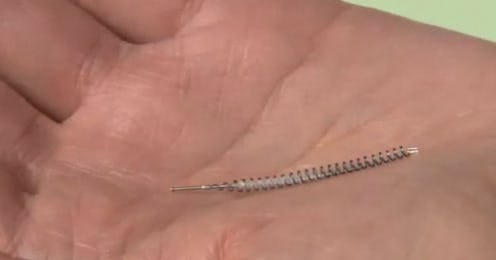News
Essure, Birth Control Method of Your Nightmares

No birth control method is without its controversy. The latest: hundreds of women say the non-surgical, permanent birth control method Essure has ruined their lives. Rather than providing a low-risk, highly effective birth control option, women say Essure has caused them migraines, cuts to internal organs, and inflammation so advanced that many of their doctors have recommended hysterectomies. (In a statement, Essure says: "These stories, while compelling, are not representative of the hundreds of thousands of women who have relied on Essure since its FDA approval in 2002.")
Essure is marketed as the only permanent birth control method that doesn't require surgery. Like an IUD, it is inserted by a gynecologist, and recovery time is only around 45 minutes. Unlike an IUD, Essure is inserted into the fallopian tubes, where tissue grows around them overtime and eventually forms a permanent barrier between the ovaries and uterus, preventing pregnancy by keeping eggs out of the uterus. The device was approved by the FDA in 2002, and about 750,000 women have had it implanted since it went on the market. The procedure makes scientific sense, even to the non-scientist. If an egg can't travel to the uterus, it can't be fertilized. It sounds like the scientific community's gift to women: it's relatively non-invasive, it's long-term and it's affordable because it doesn't require an anesthetic or an overnight hospital stay.
Sarah Payne had the insertion procedure in 2010, and spoke to news station KFOR about the after-effects:
It was like a ripping. When you stand up it feels like someone’s taking your muscles or your insides and trying to pull them apart. It would take me to the floor.
After insertion, she told KFOR, she experienced hot flashes, hair loss, severe pain, and night sweats. In her opinion, the Essure coils have caused early menopause. After speaking with several doctors about her experience, she said, they have all come to the same conclusion:
He said, ‘Your only choice is to have a hysterectomy, and then we’re going to put you on bio-identical hormones.’ And all I could think about was more pills.
Like Payne, thousands of women have claimed to have side effects that range from inconvenient to devastating and life-changing. Some say that they have become pregnant after insertion of Essure, rendering it essentially ineffective (the FDA claims that Essure is 99.83 percent effective). Many women have publicly shared their stories on the Essure Problems website, which also serves as a campaign demanding that the FDA pull Essure (produced by Bayer) off the market. Famous consumer advocate and activist Erin Brockovich (yes, that one!) has taken on the cause.
These coils are breaking apart. So beyond the discomfort, and the chronic pain and bleeding, they're migrating. ... It's ruining relationships and their marriages and that part of their . They are having health effects where it's migrated and lodged in the lining of their stomachs. In some instances they can't find where the coils have gone.
Brockovich describes a scenario she says she's heard several times: coils have migrated away from their placement in the fallopian tubes and created a passageway for an egg to a uterus, where they were then fertilized and women have become pregnant, at which point it's too late to remove the coils. In some cases, women say they had to accept these unplanned pregnancies that they thought they were diligently preventing, only to find that they lost the pregnancy after the lost coils perforated the amniotic fluid.
Perhaps the most troubling part is that women are legally unable to sue or seek financial compensation by Bayer. Conceptus, the company that created Essure, and is now owned by Bayer, sought and was awarded premarket approval (PMA) for the coil. PMA is essentially the FDA's way of saying that, because of the rigorous testing done in advance of putting a product on the market, there is no way to sue them if something goes wrong; the agency is denying in advance that the product could fail.
A Bayer representative responded to KFOR to the thousands of claims of adverse effects:
Essure was approved by the FDA in 2002 and has more than a decade of research and development behind it. It does what it is intended to do, provide an important alternative to tubil [sic] ligation. The fact is, that the adverse events that have been reported on the news and online about Essure are known and are listed in the Essure product information.
Here's Essure's full video response.
Images: Essure Problems/Facebook